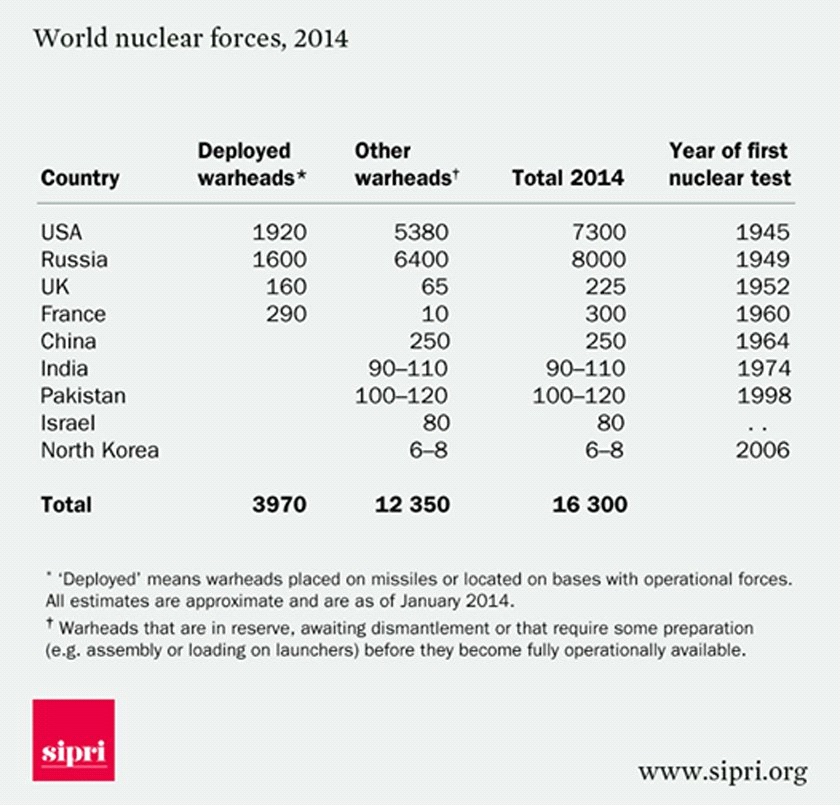An Everlasting Debate: Atoms for Peace

Since the 1940's the debate over abolishing nuclear weapons has been on the table. Through a growing awareness of the need for nuclear disarmament, there has been a consensus on the use of weapons to be examined in terms of their bad sides and good sides.

The countries that have nuclear weapons have been also criticized since they ignore both destructive and devastating effects of nuclear weapons. The countries act correspondingly on behalf of the NPT (Treaty on Non-Proliferation of Nuclear Weapons) which entered into force 1970. Some countries support the dispersal of nuclear weapons, and other countries pass the hurdles not to have nuclear technology. It is however obviously not enough to put this issue under ineffective international control, as we can see with the large amount of nuclear weapons that have risen since the nuclear arm race during the Cold War era. In this article I focus mainly on the arguments of the countries which are supporters and opponents of the usage and accommodation of nuclear weapons, and try to give some insights correspondingly.
"The most important Manhattan Projects of the future will be vast government-sponsored
enquiries into what the politicians and the participating scientists will call ‘the problem of
happiness’ – in other words, the problem of making people love their servitude."
Brave New World, Aldous Huxley
The 9 countries and their Arguments in favor of Nuclear Weapons
The countries which are officially recognized by the NPT of having nuclear weapons are the US, Russia, UK, France, and China (as the members of the United Nations Security Council and NATO). The others are India, Pakistan, Israel, North Korea who pursue ballistic and cruise missile and sea-based nuclear delivery systems as de-facto nuclear weapon states, though being outside the NPT. Nevertheless it does not mean that these are the only countries unsupportive of pursuing nuclear disarmament or being part of unweaponized technological order. The countries that accommodate the nuclear weapons of the US are namely Belgium, Germany, Italy, and the Netherlands together with Turkey. All 9 weaponized countries claim that their nuclear programs are based in peaceful purposes, therefore they promote the peaceful use of nuclear technology. I will argue that their existing arguments are tarnished as they obviously violate the law.
The main arguments against nuclear weapons mainly consist of a fact of security on behalf of the whole population and deterrence for a potential major War. To articulate the argument it should be seen that the states that are pro-nuclear weapons have strong attachment to the usage of nuclear weapons. Based on global defense-war deterrence as both myths are connected to each other and given the fact that they embrace the ideas of having such power through nuclear weapons could make the nation more defendable. Logically speaking, no one wants to have a conflict which can end in aggressive usage of nuclear weapons. It seems like having nuclear weapons in the state can be functional as a fighting force to intimidate external threats and/or inflict damage of rivals in case of war, and secure the lives of citizens.
Besides this argument having nuclear weapons depend on a military capacity and the financial budget of the state. This is therefore a reason not to destroy a rival state in the face of war. Needless to say, the legitimate usage of nuclear weapons in war causes strengthening pro-nuclear policy as Iran's Nuclear Deal took place a few months ago. Widely accepted by officials that Iran protects the regime’s nuclear infrastructure and development through Iran's nuclear capability, and this potentially allows Iran to become a more robust threshold to become a nuclear breakout state.
To defend the usage of nuclear weapons is based on the purpose of deterrence as we witnessed during the Cold War era. During this period Soviet policy was in the favor of the conviction that a nuclear war could be fought and won. The US adopted nuclear deterrence afterwards, and henceforth they both developed strategic deterrence towards each other. Throuh this history we can better understand the argument that entails an inductive approach. In other words, nuclear armed nations argue that nuclear weapons deter terrorists therefore usage of them would be deterrent against attacks. According to a prevalent myth, the US used the nuclear bombs (Little Boy and Fat Man) over Hiroshima and Nagasaki in 1945 (subsequent to their ultimatom by the Potsdam Declaration with the purpose of the unconditional surrender of all Japanese armed forces) to help shorten the war against Japan, and thus they saved lives of thousands, if not millions in the long term.
Being realistic in this context is important. The president of the US, Obama, remarked when he entered the White House that "I state clearly and with conviction America's commitment to seek the peace and security of a world without nuclear weapons". It is a positive statement, however it has been somewhat neglected. Of course, there has been some attention to this issue to reduce nuclear arsenals since Obama entered the office in 2009, however there has been no a significant progress as the US still keeps the second largest number of deployed nuclear weapons (7,300 out of 17,000 in the world). Another argument of nuclear weaponized countries who are protagonists in the story of humankind believe that disarmament in the whole world is not feasible, therefore the only thing to do is to tolerate them. It should be a pretext in spite of its cynicism.

Report by Stockholm International Peace Research Institute (All estimates are approximate and are as of January 2014)
Countries abandoned Nuclear Weapons and Arguments for Anti-Nuclear Future
After the collapse of the Soviet Union, the arsenals in Ukraine, Belarus and Kazakhistan were dismantled, and they stopped maintaining them in the country due to their high cost, shipping them to Russia. The Russian State currently has roughly 8000 nuclear stockpiles just after having tested its first device at Semipalatinsk in 1949. In respect to the New Agenda Coalition in 1998, Brazil, Egypt, Ireland, Mexico, New Zealand, Slovenia, South Africa, and Sweden adopted the goal of having a Nuclear Free World Policy. The 8 nations assured that they would never be produced again. South Africa was the first country to relinquish nuclear weapons voluntarily in accordance with the adherence to the NPT due to the creation of an African nuclear-free zone after having pursued a nuclear weapons program from 1974 to 1993. Concerning its nonproliferation effort, South Africa has minimized its uranium rate lately, even so much as to export significant amounts of uranium to provide part of the supply to the Manhattan Project (which was research to produce the first nuclear weapons between 1942-1946 towards the end of World War II). After the ratification of the NPT and being under the leadership of Kaddafi, Libya voluntarily eliminated all nuclear materials, equipment and programs from their nuclear program in 2003.
Besides these countries, the main arguments of the others which have the anti-nuclear weapons programs and non nuclear policies is to strive for a nuclear weapons-free world. They are mainly concerned about their economic, environmental, radiation-based health effects as consequences, together with their humanitarian impact based on moral and ethical concerns.
The economical dimension of these arguments is based upon their cost of production and testing activities. As a recent report published by Global Zero in 2011, the whole amount of annual expenditure by 9 countries on nuclear weapons is estimated at more than $ 104 bn dollar in modernizing and maintaining nuclear arsenals. As it's a huge amount of money, a great amount of countries that carry out anti nuclear weapons program argue that this amount should be spent for human needs instead. Furthermore, most nations tested nuclear weapons throughout the 20th century, and nuclear testing has been used as indicator of both scientific and military strength. Each atmospheric, underground underwater tests cost an extraordinary amount of money supply.
For the environmental case, nuclear weapons can cause devastating agricultural collapse and widespread famine. Long-lasting effects on the Earth’s environment can result in negative effects in wildlife, such as genetic disorders. In addition to this, nuclear weapons are the most important danger to the planet by people, more than global warming or ozone depletion. The greater amount of smoke makes global temperature colder that can be problematic for agricultural regions. For example nuclear submarines in the north of Russia are still armed with nuclear warheads that are rusting away gradually. Moreover, when at the Chelyabinsk nuclear weapons site in Russia exploded (Kyshtym disaster) a radioactive cloud dispersed and agricultural region containing numerous rivers and lakes. This site is viewed as one of the most contaminated places on earth. Much like Chelyabinsk, nuclear sites pose an enormous amount of danger. Consequentially, agricultural rivers have been polluted and lakes have been used to hold large quantities of liquid radioactive materials.
Worldwide dispersion of radioactivity from nuclear testing has a long-term health effect. As we also tragically saw through the explosion in Hiroshima and Nagazaki 70 years ago, radiation exposure and fallout has affected new generation by causing the incidence of cancer, genetic disease as well as infertility.
Apart from the above factors, there is an ethical aspect of atom bombs. It should be obviously taken into consideration that any use of nuclear weapons could cause grave humanitarian impact through killing civilians, this is not acceptable. The greatest condemnation for nuclear weapons offers a moral question: Concerning the arguments above, how can nuclear weapons with their potential mass destruction be justified? The deep conviction for elimination is rooted by the dignity of human life, and considering it as a moral obligation. There is no any convincing argument for a reason to kill people massively by a nuclear war or nuclear hegemony. There is a need to cultivate a political consensus on the unacceptability of nuclear weapons.
Outlook: "Why does nuclear abolition a matter to you"
Given all the arguments do not provide us a safe world with atoms. These traditional core goals of deterrence would not bestow a privilege to accommodate any of them. Neither tolerance to them nor ignoring the consequences of them help living in a healthy environment in peace. There are victims rather than victories in the end just because of the interests of states and immature justification for their military development. The security and deterrence fact of countries which have nuclear principals or violate of the NPT do not justify themselves with their arguments for the sake of human lives and environmentally sustainable development that consider all human beings in the planet. Considering the facts, a single weapon obviously and directly threatens global security as well as human survival. Needless to say, any use of nuclear weapons would cause long-term and widespread human and environmental harm through radioactive fallout. For peace, security, development, the elimination of nuclear weapons in respect to their effects, would be a great asset in preventing any possible war in the future as they are capable of destroying the entire planet in a matter of hours with no mercy. In this respect, there should be actions against the development and maintenance of nuclear weapons since each of them is a catastrophe waiting to happen.
Recommendations
Disarmement organizations with their international campaigns play a major role to be effective on de-weaponization and peace movements. By being supported by academicians, scientists, UN officials, direct action groups, political parties and several Nobel Laureates, they can have salient strategies, such as lobbying, petitioning government authorities, referendum campaigns and so forth. As for civilians and civil society, intense public pressure for taking actions to the state officials who are pros of nuclear weapons would be a great asset towards alleviating of atom-oriented problems and being entirely preventable.
NPT, IAEA, CTBT, NATO: There should be a strong force on the implementation of the NPT which enshrines the right of nuclear power to the states on condition that they promise not to develop nuclear weapons. The UN International Atomic Energy Agency should ensure that the current nuclear materials are not used for military forces even if they somehow give the rights to the states so as to promote the spread of nuclear technology. Plus, the states which refuse to sign and/or ratify the Comprehensive Test Ban Treaty, should be convinced that they could be banned from all nuclear testing explorations as those testing sites demand a great deal of state finances. NATO should review its nuclear policy, and the conventional missile defence forces of its member states.
Nuclear-weapons states: The most significant action on disarmament should be made by them. What we have seen so far is that the gathering of political leaders, diplomats, officials, and experts every five years for the revision of the NPT have not worked out very well even if there were bureaucratic debates. They should multinationally discuss both concretely and seriously the elimination of nuclear arsenals and stockpiles as well as prevent the proliferation of nuclear weapons materials in order to come to a productive conclusion. A large-scale convention for the withdrawal of US nuclear weapons from Europe, together with preventing Iran from building nuclear weapons may be successful to achieve a principal goal for a nuclear-free world.
A Brief State to Conclude
As history has shown the unneeded catastrophic consequences, such as "Little Boy" or "Fat Man" that made Hiroshima and Nagasaki suffer and create hibakusha (the surviving victims of the 1945 atom bombs).
Abouth the author
Pinar Temocin is an intern at Institute of International Relations Prague